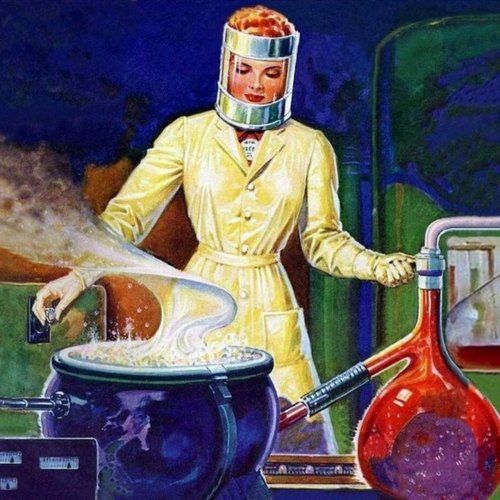I love a good conspiracy theory. The more outlandish the better, too. If you can connect Justin Timberlake, Kim Jong-Un, and the moon landing – we might be best friends.
What I don’t love is a pervasive myth that keeps spreading via people who really, really should know better. Just recently a garden writer wrote an article stating that fresh wood chips should NOT be used as mulch because they rob the soil of nitrogen and are therefore bad for plants, especially trees and shrubs.
Survey says?
When there’s a landscape or gardening “truth” that can be verified using science, I turn to scientists. Scientists are always asking important questions and trying to understand our world better. Two researchers who have published very accessible books about science for the landscape are Jeff Gilman and Linda Chalker-Scott. In a post on Garden Rant talking about wood chip mulch, here’s what Dr. Chalker-Scott had to say in the comments:
From a scientific viewpoint, there are few drawbacks to using arborist wood chips but many benefits. It mimics what you might find in the duff layer of a forest – which is really what we should be shooting for in many of our landscapes that are based on trees and shrubs. I can say definitively that if wood chips are used as a topdressing and not worked into the soil they will not tie up nitrogen. We’ve demonstrated this in laboratory research as have others. For readers who would like a challenge, I’d invite you to read my review of the scientific literature comparing landscape mulches, published last December in the Journal of Environmental Horticulture. It also addresses many of the misconceptions held about wood chip mulches. You can email me for a free pdf of this article if you like.
From an aesthetic standpoint, fresh wood chips may leave a little to be desired, and if they just came from a brush job with thorns or poison ivy it may have some unpleasantness for you, the gardener. But for your plants? Bring on the wood chips if you want to suppress weeds, hold in moisture, and save a few bucks. The research does show that there might be an issue with shallow rooted plants like annuals and vegetables so don’t use chips there, but everywhere else? Game on.

I am not a scientist but I do my best to keep up with the latest research. If you want a landscape designed for beauty, function, and the well-being of your plants in mind, contact me!


The #1 search that brings people to my blog is ” Can I use wood chips in the vegetable garden”. Yes you most certainly can mulch your vegetable garden with wood chips despite Dr. Chalker-Scotts concerns. The minimal nitrogen loss at the soil mulch interface is easily overcome with fertilization. People’s is going to fertilize their vegetable gardens. You can pretty much rely on that without having to tell them. Loved your comment about blowers at the Rant.
http://outsideclyde.blogspot.com/2008/06/vegetable-gardens-and-woodchip-mulch.html
Christopher, that’s a good point I didn’t really think about. Of COURSE you’re amending the heck out of the soil and potentially topdressing when growing veg. Duh. Thanks for pointing it out, talk about missing the forest for the giant slab of wood hitting me in the forehead!
The blowers and the anti-lawn crusades over at the Rant have been rubbing me the wrong way for a while. Maybe I need to finish the counterpoint I’ve had on the backburner for the last 18 months.
Hello, i have been doing research and i am wanting to till chipped up pine needles and branches into my garden bed to make a hugelkultur type of a garden bed. They are from a local source who chips up Christmas trees and i am worried about nitrogen robbing. I have laid down chicken soiled straw, horse manure,leaves, table scraps and then the branches/needles. i want to till it to mix the native soil and the pre existing garden bed but i will also add more of the same ingredients as well as blood meal, bone meal, mineral rock dust, mushroom compost. I think by doing this it will speed up decomposition of the wood and create heat. I would like to find some nitrogen fixing flowers or beans/ peas too. should i be concernd with nitrogen robbing?
Joe, hard to say. It sounds like you’re introducing a good bit of nitrogen as well as some stuff that’ll help speed decay, but how quickly are you planning to plant in this mix? If you’re here in the states you can probably get some good advice from your local county extension office.
I would be more concerned about any fire-proofing chemicals sprayed on Christmas trees as to the negative effects they would have on plants planted in the mulch from the Xmas trees.
If you put fresh woodchips down in a young orchard it may turn their leaves yellow. Talking from experience.. They will bounce back, but better to let the woodchips age/mellow a little before use.. I never ever till them in
interesting, not a result I’ve heard of! Is it only young trees, as opposed to mature ones?
I’ve just gone no till, I’m sourcing decayed wood from UK hedgerows and woodland. I’m piling the wood up after every dog walk to let it deacy further. I’m then going to manualy brak the wood into usable size for chips and mulch by hand. My father has warned me not to use this method. We have several apple trees and a pear which I’m going to experiment with this coming season and also see how my other regular perennial and annuals do. Thanks for advice
I am a Virginia master gardener intern, with a scientific background. Having used fresh wood chips to mulch my garden for years, I have not seen evidence of nitrogen stealing. I converted to no-till several years ago, and use composted browns/greens and horse manure as fertilizer. I add the chips later after the vegetable seedlings are established, mostly to retain moisture in the summer. I have sought practical data about nitrogen stealing due to wood chips, but have not found much except theoretical speculation or lab/formula-based information (that includes plant nitrogen cycle but not ecosystem bacteria/fungi). I found one pacific northwest study that had two older references – both suggesting that microbes in the foodsoilweb provide nitrogen in the wood chip breakdown process, in contrast (or complementary to) the traditional teaching about stealing. What do you think? Are you aware of any newer or better references
https://www.seattle.gov/Documents/Departments/SPU/3AntieauWOODINSOIL.pdf
I haven’t. I occasionally check in with the Garden Professors Blog (and also their FB page). Since Dr. Chalker-Scott is probably who all lit reviews point back to, that’s the place to look.